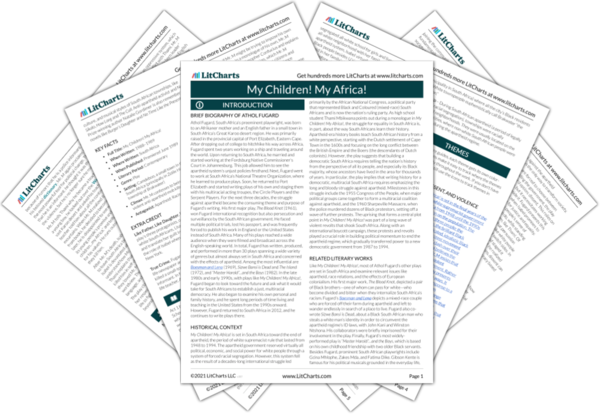Township Quotes in My Children! My Africa!
I’ve actually been into it quite a few times. With my mom to visit Auntie, our maid, when she was sick. And with my dad when he had to take emergency medicines to the clinic. I can remember one visit, just sitting in the car and staring out of the window trying to imagine what it would be like to live my whole life in one of those little pondoks. No electricity, no running water, no privacy! Auntie’s little house has only got two small rooms and nine of them sleep there. I ended up being damn glad I was born with a white skin.
I discovered a new world! I’ve always thought about the location as just a sort of embarrassing backyard to our neat and proper little white world, where our maids and our gardeners and our delivery boys went at the end of the day. But it’s not. It’s a whole world of its own with its own life that has nothing to do with us. If you put together all the Brakwaters in the country, then it’s a pretty big one—and if you’ll excuse my language—there’s a hell of a lot of people living in it! That’s quite a discovery you know. But it’s also a little—what’s the word?—disconcerting! You see, it means that what I thought was out there for me…no! it’s worse than that! it’s what I was made to believe was out there for me…the ideas, the chances, the people…specially the people!…all of that is only a small fraction of what it could be.
(Thumping his chest with a clenched fist) I’ve got a whole zoo in here, a mad zoo of hungry animals … and the keeper is frightened! All of them. Mad and savage!
Look at me! I’m sweating today. I’ve been sweating for a week. Why? Because one of those animals, the one called Hope, has broken loose and is looking for food. Don’t be fooled by its gentle name. It is as dangerous as Hate and Despair would be if they ever managed to break out. You think I’m exaggerating? Pushing my metaphor a little too far? Then I’d like to put you inside a black skin and ask you to keep Hope alive, find food for it on these streets where our children, our loved and precious children go hungry and die of malnutrition. No, believe me, it is a dangerous animal for a black man to have prowling around in his heart. So how do I manage to keep mine alive, you ask. Friends, I am going to let you in on a terrible secret. That is why I am a teacher.
I look around me in the location at the men and women who went out into that “wonderful future” before me. What do I see? Happy and contented shareholders in this exciting enterprise called the Republic of South Africa? No. I see a generation of tired, defeated men and women crawling back to their miserable little pondoks at the end of a day’s work for the white baas or madam. And those are the lucky ones.
[…]
Does Oom Dawie think we are blind? That when we walk through the streets of the white town we do not see the big houses and the beautiful gardens with their swimming pools full of laughing people, and compare it with what we’ve got, what we have to call home? Or does Oom Dawie just think we are very stupid?
My head is rebellious. It refuses now to remember when the Dutch landed, and the Huguenots landed, and the British landed. It has already forgotten when the Old Union became the proud young Republic. But it does know what happened in Kliptown in 1955, in Sharpeville on twenty-first March 1960 and in Soweto on the sixteenth of June 1976. Do you? Better find out because those are dates your children will have to learn one day. We don’t need Zolile classrooms anymore. We know now what they really are—traps which have been carefully set to catch our minds, our souls. No, good people. We have woken up at last. We have found another school—the streets, the little rooms, the funeral parlors of the location—anywhere the people meet and whisper names we have been told to forget, the dates of events they try to tell us never happened, and the speeches they try to say were never made.












